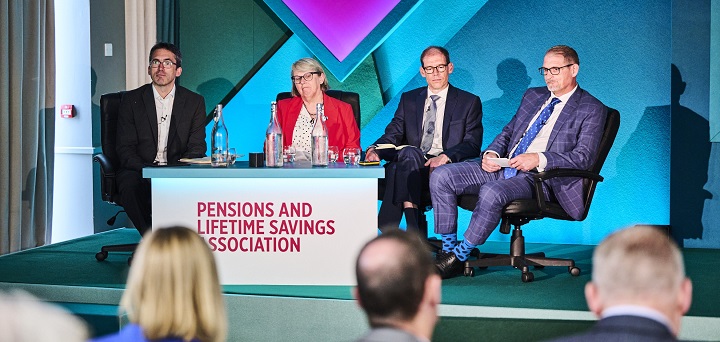The majority of investors participating at the PLSA’s Local Authority Conference are wary of potential government initiatives to push for further LGPS consolidation, a poll at the industry event held in the Cotswolds revealed.
Government plans for “further and faster pooling” remain a key concern for investors for local government schemes, as debates at this year’s PLSA Local Authority Conference highlighted. Some 55% of delegates said that they either disagreed or strongly disagreed with further consolidation of pools, an even higher figure of 60% said they were either “very concerned” or “fairly concerned” about the potential for further mandatory consolidation among pools.
“Get on with the job”
But despite these outspoken views from the crowd, the panel sessions on the future of pooling were dominated by a sense of uncertainty about the political outlook. With further details of the government’s pooling proposals likely to be disclosed at the chancellor’s Mansion House Speech next month, speakers held back with detailed forecasts. But what did transpire was a growing sense of frustration about the vacuum the LGPS has found itself in.
“We spend a lot of time needlessly speculating about the future of pooling and there are so many other big issues the LGPS needs to deal with,” argued Peter Wallach, director of the Merseyside Pension Fund. “As a fund, we have put one or two activities old hold to await the future of pooling and in hindsight, we should have just cracked on,” Wallach said.
This sentiment was echoed by Neil Mason, assistant director at Surrey County Council, who argued that pension funds are not distracted by speculation about potential reforms and “just get on with the job.”
But with the Labour party leading in the polls and another less than two years away, many delegates believed the government was unlikely to introduce dramatic changes to the LGPS. “I don’t think we will see any major reforms of the LGPS forthcoming in this election cycle,” one attendee told Room 151 in between sessions.
Jill Davys, director and head of LGPS at Redington, highlighted that getting on with the job was far from straightforward when changes to schemes’ asset allocations and decisions about pooling come at a cost. “There needs to be more transparency and clarity from government,” she stressed.
_____________________________________________________________________________________
Room151’s 4th LGPS Investment Forum
8th November, 2023, London FREE for LGPS Practitioners
_____________________________________________________________________________________
Diversification challenges
For Chris Greaves, pension committee member at West Yorkshire Pension Fund, a key concern remains to what extent government intervention could jeopardise investment diversification. The £17.7bn fund has currently roughly aligned its portfolio with a 60/40 strategy, albeit with a heavy focus on diversification within the respective categories.
The fund, which is part of the Northern LGPS, is considering to adjust its asset allocation in response to the rising rate environment. But placing assets in private market remains an option that is fraught with challenges, not the least in terms of practical execution, such as the ability to invest without influencing pricing.
Another concern for Greaves is concentration risk. “If the government were to tell us, you have to invest 5% in UK infrastructure, that would worry me,” he said, adding that he would ideally seek for higher levels of geographic diversification in assets such as infrastructure.
Any government intervention such as a mandatory 5% investment in infrastructure, as has been floated by Labour’s shadow chancellor Rachel Reeves for DC investors would therefore come with a trade-off.
“We are already quite heavily invested in the UK in our equity portfolio, if we were told to invest 5% in UK infrastructure, we would then have to reduce our UK exposure elsewhere,” he told Room 151 on the sidelines of the conference. “There is a fundamental difference between the LGPS and a Sovereign Wealth Fund, which is that Sovereign Wealth Funds don’t have to pay pensions,” quipped his colleague Andrew Thornton, joint committee member at West Yorkshire.
Scrutiny on cost and performance
These concerns aside, pension funds appear to have moderately increased their exposure to private markets and alternatives, the latest LGPS Board Data suggests. Over the past two years, schemes appear to have increased investments in sectors such as property and private equity by 0.2% and 0.6% respectively, at the expense of conventional asset classes. But this data is blurred by the fact that close to 70% of LGPS assets are now held in pooled investment vehicles, where a detailed asset allocation breakdown has not been disclosed.
Having said that, one indication for the trend towards private markets could be the rise in management costs. Between 2021 and 2022, management charges for the LGPS had increased by more than 22% to a total of £385m, with about a third of that being performance fees, which are typically only paid in private markets.
This trade may have paid off for now, with higher returns on assets such as private equity and property offsetting losses in conventional asset classes, according to the Scheme Annual Report. Year on year, schemes reported a net return on investment of 8.1%.
However, this is based on figures from the year ending March 2021, with performance figures in private markets including an even greater time lag. Whether the shift to private markets will pay out in the long run is now likely to face closer scrutiny.
—————
FREE weekly newsletters
Subscribe to Room151 Newsletters
Follow us on LinkedIn
Follow us here
Monthly Online Treasury Briefing
Sign up here with a .gov.uk email address
Room151 Webinars
Visit the Room151 channel














